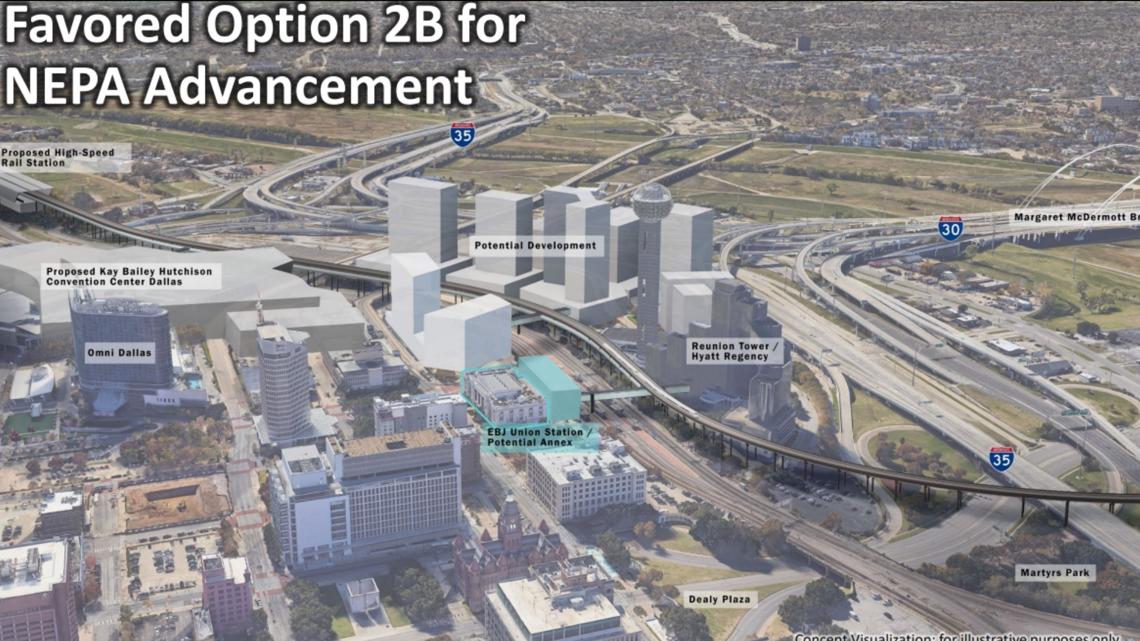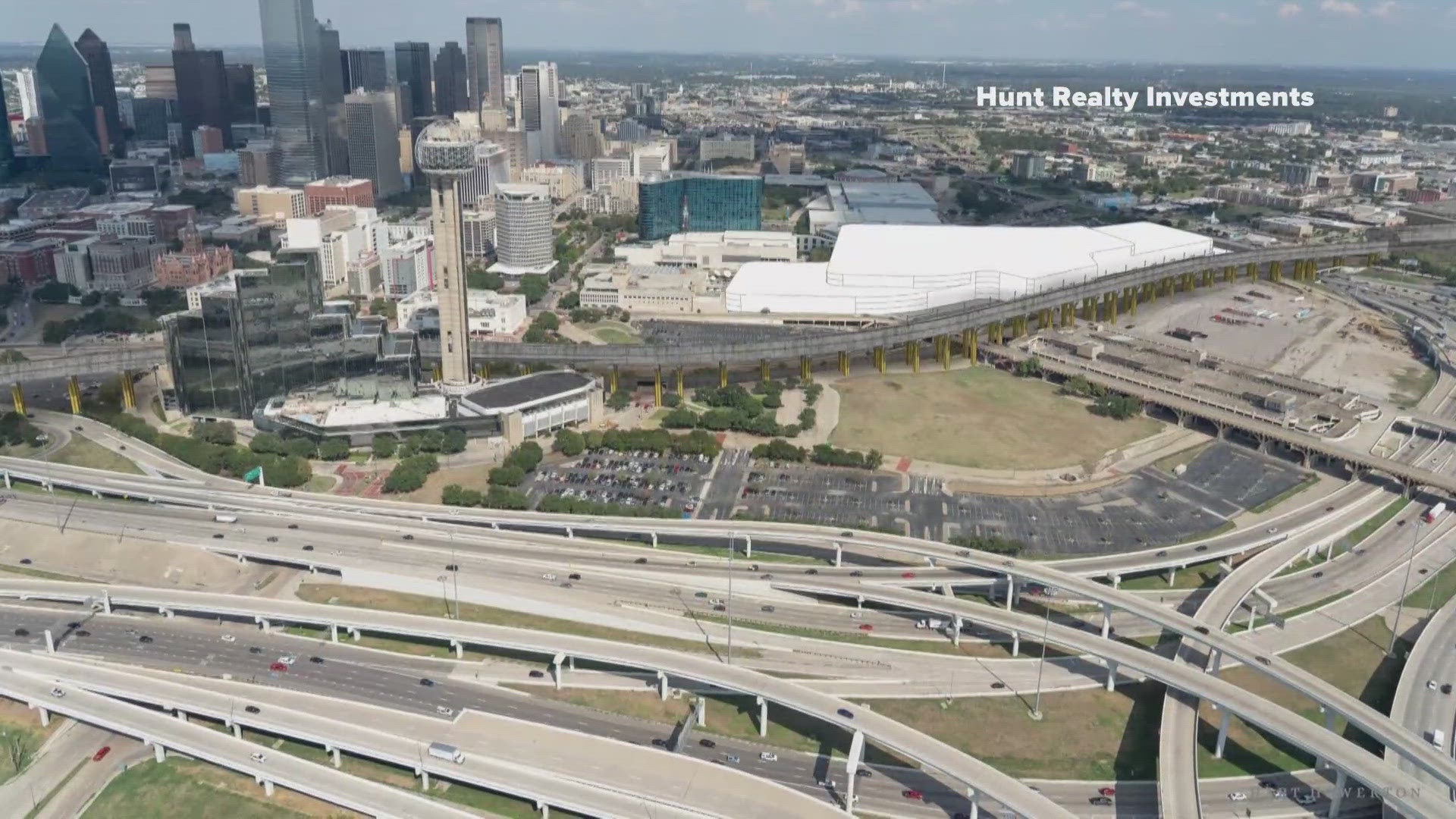DALLAS — The 45-member Regional Transportation Council met Thursday at the North Central Texas Council of Governments (NCTCOG) to review the plan for a potential high-speed rail line between Dallas and Fort Worth. At times, the meeting was tense.
The proposed adjustment to the final mile of the route is a sort of compromise meant to move the project forward. Engineers hope bypassing downtown Dallas will alleviate concerns the elevated train tracks would interfere with planned development, including renovations to the Kay Bailey Hutchison Convention Center.
"As the director, it's my job to make lemonade out of lemons and pull the Regional Transportation Council together," NCTCOG transportation department director Michael Morris said. "This keeps us alive."
The council could adopt the adjusted proposal at its August meeting, though Dallas's full city council has yet to indicate whether the compromise is acceptable.
Plans need to be finalized soon so DFW can get in the front of the line for transportation funding that will become available. The federal government generally prioritizes projects considered "shovel-ready," meaning preliminary design and engineering work is finished.
"As a region, we have to meet these deadlines," Arlington Mayor Jim Ross said. "We cannot allow one part of the region to jeopardize our ability to meet the deadlines that are required."
Previous iterations of Dallas's city council expressed support for the route that cut through downtown Dallas. But, in June, current Dallas Councilmembers unanimously opposed moving forward with the high-speed rail project until an economic development study is complete.
At the time, a prominent developer raised concerns that that route could impact businesses, including Reunion Tower, and warned the route’s proximity to the landmark could cause them to “sacrifice” hotel rooms and the tower’s iconic ball. The tracks would also be anchored in developable land, potentially interfering with planned construction.
"I prefer to tap the brakes, slow things down a little bit, so that we get good policy," Dallas city councilman Omar Narvaez told the Regional Transportation Council Thursday.
Confident in the proposal, Arlington and Fort Worth each offered to pay for some of the economic impact study Dallas has commissioned.
"This is going to happen," Ross said. "Neither Arlington, nor Fort Worth, nor Dallas, nor anybody has the sole authority to stop this process."
Some Dallas city council members who also sit on the Regional Transportation Council expressed gratitude Thursday for the suggested alternative.
But bypassing downtown Dallas might sacrifice some connectivity, Morris noted.
The train would stop at the same location in The Cedars under each proposal, but the previous iteration offered more direct access to downtown.
Engineers envisioned moving walkways, similar to those at the airport, attached to the elevated train tracks running through downtown. Train passengers could exit the walkways to the Hyatt, the convention center, or Union Station using sky bridges.
The Union Station connection would be particularly important, because it'd link the high-speed rail line to existing DART and TRE trains.
If the train tracks go around downtown, Dallas leaders will have to determine how to get passengers from the train station back to its business district.
"When you're competing with the airlines, time and cost are very important," Fort Worth city councilmember Carlos Flores said. "In my thinking, passengers are dissuaded from using something like rail if there's an added element: the time and having to get to that final destination."


The project is particularly important for Arlington, which does not currently have a mass transit system. The train would stop at the city's booming entertainment district, with a pedestrian connection to its new convention center.
More broadly, the connector would extend a proposed high-speed rail line from Houston to Dallas. It could also eventually complete the "Texas Triangle," a route connecting Austin, San Antonio, and Laredo to Fort Worth.
Thursday's meeting became somewhat tense when Dallas City Councilmember Cara Mendelsohn questioned whether the Dallas to Houston line will come to fruition.
"We don't know that, actually, Dallas to Houston will even happen," she said. "So this entire conversation seems extremely premature."
Mendelsohn also questioned whether Arlington would be able to participate in the project and construct a train stop because it is not currently part of any transportation authority. She asked staff whether the project could move forward without an Arlington station.
The suggestion "perplexed" Ross, he said.
"Arlington has demonstrated our willingness to do what is necessary to stay engaged," he said during Thursday's meeting. "Not having a stop in a city that hosts the World Cup, Super Bowl, World Series, and - this coming week - an All-Star Game is ludicrous."
"It might have something to do with certain members standing up at councilmember meetings and saying things such as, 'Why would we want to stop in Arlington and lose more conventions to Arlington?" Ross continued. "This is not competition. I want Dallas to get all the damn conventions they can handle because Arlington will benefit."
Other Regional Transportation Council members, including those serving on Dallas' city council, expressed support for Arlington and Ross' point.
"I don't think one individual speaks for all of Dallas," Ross said, after the meeting.
Fort Worth Mayor Mattie Parker has issued statements in support of the project.
“High-speed rail is an integral part of our transportation future and it will include Tarrant County,” Parker wrote in a statement earlier this month. “An economic feasibility study on the impact of high-speed rail across the Texas network, including the ‘Texas Triangle’, is not a unilateral decision. This is a regional decision that will require the stakeholders and elected officials to collaborate and solve complex problems for the advancement of our North Texas region. I am confident that the RTC (Regional Transportation Council) and other stakeholders are positioned to navigate the complexities of the high-speed rail system to see that the route includes Arlington and Fort Worth.”
There is already a commuter rail line, the Trinity Railway Express, between Dallas and Fort Worth. It takes about an hour to travel from one end of the line to the other.
Morris likened the TRE to surface-level streets designed for local travel. He compared high-speed rail to a freeway, noting the two serve different purposes.
Even with planned road improvements, NCTCOG researchers expect drive time from Dallas to Fort Worth to grow from 48 minutes to 75 minutes by 2045.
Travelers could get from Dallas to Fort Worth in 30 minutes on a high-speed rail system.
"What would people in 2050 say they would have liked us to do back in 2024?" Morris asked.

